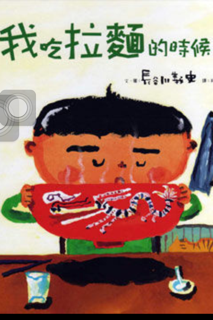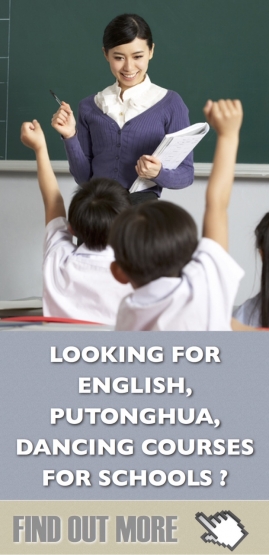National Education
 How to use picture books to inspire children to think about civic awareness?
How to use picture books to inspire children to think about civic awareness?
There is a plethora of picture books available in the store, so how should parents select those suitable for civic education of their children? Miss Yeung from the Parents’ Concern Group on National Education said that the selection of picture books for children should stem from the individual interest of the child, so parents should allow some degree of freedom for their children because in general the picture books promote positive messages and values for them. However, if the child normally will only choose princess or Superman themed picture books, should parents intervene? Miss Yeung points out that suitable intervention to allow children exposure to subjects outside of fairy tales or superheroes will undoubtedly be more beneficial to the child. So parents can encourage children to explore other topics without forcing them to do so, otherwise they will lose interest in the picture books.
So, having selected the right picture books for your children, when is the best time to read the books with them? Miss Yeung pointed out that picture books are ideal to be read in a relaxed and cheerful atmosphere, so it is not a bad choice for bed time stories. Fifteen minutes before bed time every day can be spent reading the picture books together, and parents can even ask children questions depending on their interest to develop their thinking abilities, as well as encourage their children to ask their own questions. This creates an interaction from reading the picture book, which is helpful to develop reading habits. Miss Yeung also notes that a key to children developing a habit of reading picture books is for the parents to listen patiently. Therefore, even if the child asks a basic question the parents should still respond appropriately and not show signs of impatience
Nonetheless, Miss Yeung indicates that many parents cannot resist from asking questions of an academic nature when reading picture books with their children. For example, “Do you recognize the word ‘autumn’?” Or when reading about children that have to work to support their family in developing parts of China they may comment that “Remember how lucky you are! Remember to study hard and eat right every day!” This turns what should be a relaxed and pressure free reading activity into a vocabulary test or a lecture that adds pressure to the children, preventing them from making a habit of it.
Miss Yeung reminds parents that some picture books are more suited to reading in the day time due to the heavier themes involved. For example, Parents’ Concern Group on National Education recently published a “Civic awareness education booklist”, and one of the recommended title “When I eat ramen…” discusses the lives of children in different areas, which includes children in developing areas. One of the scenes describes a child collapsing, and although parents may realize that the child has died, but the nature of picture books are open ended to allow children room to discuss and think. So parents may ask “Why did the child collapse? Is there any way we can help him/her?” Thus, even if the picture book is describing a negative incident, a discussion about how to help the child can create positive messages for the children, and in the process of discussion the children can put themselves in the shoes of this unfortunate child. This is an opportunity for children to develop sympathy, and is helpful for building a healthy and considerate character.
involved. For example, Parents’ Concern Group on National Education recently published a “Civic awareness education booklist”, and one of the recommended title “When I eat ramen…” discusses the lives of children in different areas, which includes children in developing areas. One of the scenes describes a child collapsing, and although parents may realize that the child has died, but the nature of picture books are open ended to allow children room to discuss and think. So parents may ask “Why did the child collapse? Is there any way we can help him/her?” Thus, even if the picture book is describing a negative incident, a discussion about how to help the child can create positive messages for the children, and in the process of discussion the children can put themselves in the shoes of this unfortunate child. This is an opportunity for children to develop sympathy, and is helpful for building a healthy and considerate character.
Yeung pointed out that the way picture books inspire children to think about civic awareness occurs through the following logical process, which is:
1 ) context (children imagine the situation facing the main characters from reading the picture book)
2 ) immersion (they step into the role of the main character through following the story)
3 ) contemplation (thinking about the problem faced by the main character in the story)
4 ) action (putting into practice the conclusion derived from thinking about the issues, such as protecting the environment)
Furthermore , Yeung highlights the three different levels of citizenship ::
1 ) good citizens - understand the needs of others , show respect for others and have empathy , put themselves in others' shoes .
2 ) participatory citizens - not just law abiding, but will participate in social affairs. How to train children to become participatory citizens? Try to let children make more decisions, such as choosing between going to the park for going for a swim when on vacation, or going to China or Thailand for family holiday. Help children understand the pros and cons of the decision, and at the same time train their ability to make decisions.
3 ) upstanding citizens - concerned about the community, guardian of good social values, possess the courage to step forward. For example, a book in the list “It’s not my fault” describes a bullying situation in the school grounds, and if the children witness the scene as bystanders whether they should report this to parents and teacher, do nothing or show no concern. Parents can guide their children to think through the issues.
Miss Yeung says that most of the picture books in the civic awareness shortlist are available in public library. Parents can follow the guidelines in the shortlist to select the right reading material according to their children’s age and interest to start on their civic awareness education.
YMCA Christian Academy (YCA) is a unique, community-oriented private primary school situated in the heart of Hong Kong Island. It offers a broad and balanced international curriculum rooted
Read MoreSingapore’s most forward looking primary school intends to open the doors of its first kindergarten and primary school in Greater China, offering an English and Mandarin immersion programm
Read MoreSchool tours are vital during the admissions process for a child as the tours allow the parents to meet the people responsible for educating their children, observe the school’s facilities, exam
Read MoreStamford American School Hong Kong (Stamford) is a through-train school for students ages 5 to 18 where graduates can receive both an American and IB Diploma* which allows them access to top universit
Read MoreLearning a new language can always be quite intimidating and challenging in the beginning. However, it can prove to be immensely useful in the future. We provide students the opportunity to become
Read MoreWould you like to know more about your child’s English level and other abilities, whether they are from kindergarten to secondary? There is no easy task, however, our experienced cons
Read More





